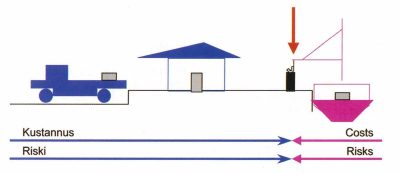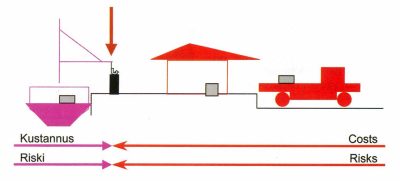Shipping terms, Quay term
Quay Term, loading
This Shipping Term can be used in connection with conventional means of cargo handling when the Contracting Shipper hands the goods over to the Carrier on the quay, to be loaded on board a vessel.
| Division of costs and risks -- Kustannusten ja riskien jakautuminen | Quay Term -- Laituriehto |
|---|---|
 | Quay Term, loading -- Laituriehto, loading |
| Quay Term, loading: The Contracting Shipper | Quay Term, loading: The Carrier |
|---|---|
1 Delivering the goods to the Carrier | 2 Taking delivery of the goods from the Contracting Shipper |
3 Division of costs | 4 Division of costs |
5 Division of liability | 6 Division of liability |
7 Other obligations | 8 Other obligations |
Quay Term, discharge
This Shipping Term can be used in connection with conventional means of cargo handling when the Carrier hands over the goods to the Consignee alongside a ship at he quay in the port of destination.
| Division of costs and risks -- Kustannusten ja riskien jakautuminen | Quay Term -- Laituriehto |
|---|---|
 | Quay Term, discharge - Laituriehto, purkaus |
| Quay Term, discharge: The Carrier | Quay Term, discharge: The Consignee |
|---|---|
1 Delivering the goods to the Consignee | 2 Taking delivery of the goods from the Carrier |
3 Division of costs | 4 Division of costs |
5 Division of liability | 6 Division of liability |
7 Other obligations | 8 Other obligations |